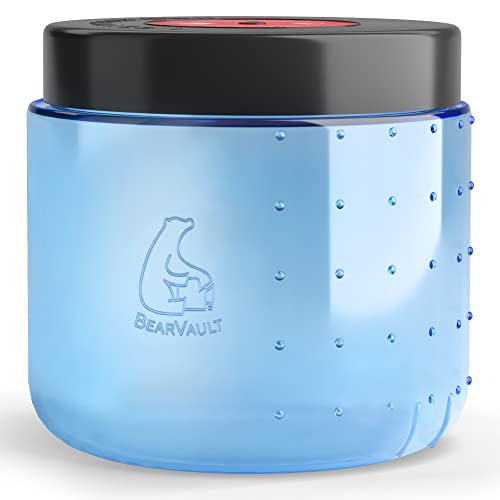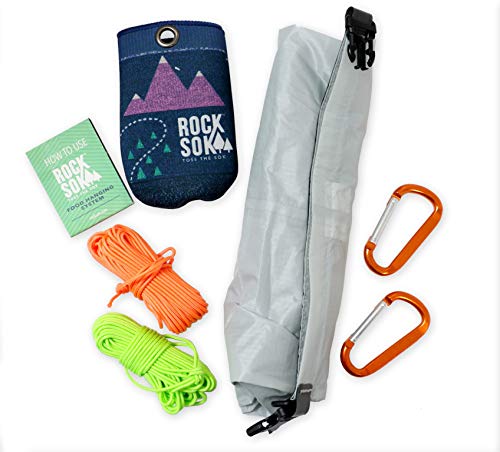Bear Safety While Camping: 11 Must Know Tips
If you are planning a hiking or camping trip in bear country, it’s best to prepare in case you come into contact with a bear at some point.

The idea of a bear encounter can be scary, but it’s something you can prepare for so you know what to do and how to practice proper bear safety. Knowing how to deter bears from entering your campsite can not only save you and your loved ones, but it can also save the bear as well.
Use our bear safety tips while camping or hiking so you can avoid a bear encounter or worse case, a bear attack.
Being “beary” aware of bears is key to staying safe while exploring the great outdoors.
Where Do Bears Live?
The first step to bear safety is to figure out if you’ll even be camping in bear country. If you’re not camping in bear country, you should still be aware of the different animals you may encounter.
Brown Bears
Brown bears can be found in the Northern part of North America (Canada, Alaska, and the North Western United States), in some parts of eastern and western Europe, Northern Continental Asia and Japan.

Grizzly Bears
Grizzly bears are a subspecies of brown bear and they are only found in Western Canada, a small area of the North Western United States that borders Canada, and Alaska.

Black Bears
Black Bears like to live in forests, and near wetlands and berry patches. Black bears can be found throughout most of Canada, Alaska, around both the Rocky and Appalachian Mountain ranges, the Northern part of the upper midwest (Minnesota, Wisconsin and Michigan), along the United State’s West coast, parts of the Southern United States and Mexico.

Fun fact: Black bears can be brown and can get mistaken for brown bears.
Polar Bears

Polar bears live mainly in the Arctic Circle. That area encompasses the northern coasts of Russia, Canada, Alaska and Greenland.
How to Avoid Bears
The best way to not have to worry about bear attacking you is to avoid bear encounters in the first place. Deterring bears is pretty easy with these bear safety tips:
Hike in Groups
If you know you’re hiking in bear country, try to have a group of three or more people. With more people, you are less likely to startle a bear and decrease your attack chances.

Groups of people usually make more noise, and loud noises will discourage bears from staying in the area. However, you should still stay alert even if you are in a big group.
Make Noise
It might feel wrong to disturb nature or you might want to just quietly take it all in, but you want to make noise while you’re hiking or camping in bear country. If a bear hears you on the way, it will be less likely to be surprised, which means less likely to attack.
Sometimes just yelling a loud noise can help. If you’re hiking with kids, it’s unlikely that they’re being quiet, so that’s often a good deterrent.
When we were camping in Glacier National Park, one of our group members liked to randomly make noise by saying “Hey bear!” Everytime he said it I got worried he was saying “Hey, a bear” because he saw an actual bear.

I recommend you avoid using “hey bear” to avoid confusion should you come across a real bear. Have your kids come up with a funny saying to yell every once in a while if you realize your hiking party has gotten quiet. Singing songs is great too!
Watch for Bear Signs
Keep an eye out for signs of bear activity, like bear prints, bear scat (bear poop) or broken underbrush.
Stay well away from any animal carcass you come across because even though bears are mostly after nuts and berries as food sources. The scent of a dead animal can trigger predatory behavior in bears.

Be aware of a bear’s natural food sources, like berry patches or the remains of cleaning a fish. This kind of thing attracts bears more than your sunscreen will.
Avoid Hiking at Dawn and Dusk
Bears are most active during dawn and dusk. If you are going to take a sunrise or sunset hike, or be around your campsite during these times, be extra cautious and stay in a group.
If you are in grizzly or brown bear territory, you want to be extra careful. This doesn’t mean you can’t hike during these times, it just means your likelihood of seeing a bear are higher.

Wear bear bells and have a headlamp for everyone in the group, so you can see each other and so you don’t startle a bear.
Food Safety
Bears that come into your campsite are likely attracted there by smells of human food. Follow these food safety tips to avoid bears paying you a visit.
Bear Canisters
Store any food as well as scented items in a bear resistant container. You can use a bear canister, or some campsites even have bear boxes to keep curious bears away from your campsite.
Scented products like lip balm, sunscreen, and even toothpaste can attract a curious bear to your camp. If you’re not sure if it will attract bears, it’s probably best to put it in the bear bag anyway. Better to lock up something than have a bear sniffing through it later!
Bear-proof containers aren’t really a thing. Not even a car is bear-proof, so when you put your food into your bear canister, also have a designated food storage area to keep bears away from your tent.
Hang Your Food in a Tree
The best option is to hang your food in a tree, at least 10 feet off the ground. If you can, try to get the canister or bag at least 5 feet away from the tree trunk.
Set up a Cooking Area
A lot of us like to cook and eat heavily scented foods while camping, like bacon and sausage. Cook these foods downwind of your tent so you’re not getting that awesome bacon smell permeated into your tent fabric.
If you can, try to cook or prepare food 100 feet away from your sleeping area. In most campgrounds, this will not be possible.
Wash dishes right after each meal and cascade the water 100 feet from your tent, or as far as possible if you can’t get 100 feet.
No Food in the Tent
Don’t bring any food into your tent and make sure you’ve emptied your pockets of food wrappers that we all know your kids shoved in there while you were on a hike.
Not bringing food into the tent is a good idea even if you’re not in bear country, you don’t want to attract bugs either.

Don’t leave food out at your campsite, store food in zip-top plastic bags and then in a food storage container designed to deter bears.
Know When Bears are Most Active
Bears are usually most active during the spring through fall months because they hibernate during the winter. If you want to avoid bears, then winter camping may be a good option!

Black bears don’t fully hibernate and in warmer climates they can be spooked from their dens even in winter.
The colder the climate, the longer they will hibernate. Bears are more aggressive right after and before hibernation when they are most hungry, so extra caution should be taken in the Spring.
Bear Encounters
If you find yourself face to face with a bear, stay calm and gather your group together. Pick up small children and keep them as quiet as possible, you don’t want your child’s whines to be mistaken for the sounds of a prey animal.

Putting smaller children on your shoulders will help you look taller and may encourage the bear to leave you alone.
Talk to the bear in a normal voice (not high-pitched baby-talk) and back away at a slow pace while keeping your eyes on the bear. You can also walk sideways if you need to switch directions while facing the bear.
This will work most times to remove yourself from their presence. Do NOT run and do not let your dogs off leash. Dogs can turn a curious bear into a predatory bear.

Have someone in your group look around to ensure you’re not walking between a mother bear and her cubs. If you ever see a bear cub, assume it’s mother can see you and leave the area slowly.
If the bear is still on it’s hind legs, it’s just checking you out, so maintain eye contact and move out of the area.
If the bear starts to walk towards you, be loud and yell at it, throw something at it, and try to “sound” big. Use a deep voice while yelling, bang pots and pans together to create a loud noise.

If the bear is performing an aggressive act, like huffing, growling or pawing at the ground, this can be a sign that it’s about to attack.
Bear Attacks
A bear attack is rare as most bears are just curious about humans and don’t see us prey.
Black Bear Attacks
If a black bear starts to attack you, try to escape to a building or a car. If that’s not possible, fight back with any tools you may have and attempt to hit the bear in the nose or face.
Grizzly or Brown Bear Attacks
If a Brown or Grizzly bear attacks you, your best bet is to lay down and play dead. Lay face down and protect your neck with your arms. Keep your legs spread apart to deter the bear from flipping you over.

Bear Spray
If you bring bear spray, learn how to use it before you go. Be aware that it is very similar to mace or pepper spray, so don’t spray it before you have to. If it is a windy day attempt to get upwind before spraying so you don’t end up with bear spray on your own face.
If you do get bear spray, be sure to get a training can so you can practice spraying it at home so you know how it works. Do not practice with real bear spray.
Distraction
If a bear is coming towards you, you can attempt to throw objects to distract it, but never throw human food to a bear. Bears learn quickly that humans have food and you’ll only teach the bear to approach more humans.
We hope that all of your camping in bear country is uneventful and peaceful!
Happy Camping!

I’m Molly Foss, aka Momma Critter. I’ve been camping since I was 9 years old and I always wanted to be Robin Hood and live in the forest when I grew up. I’m excited to share my love of camping with my son as he grows up. My favorite thing to do while camping is roast marshmallows over the fire.











